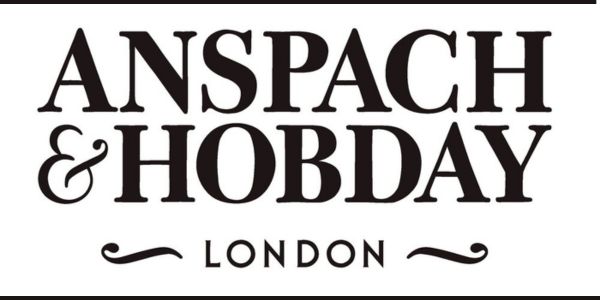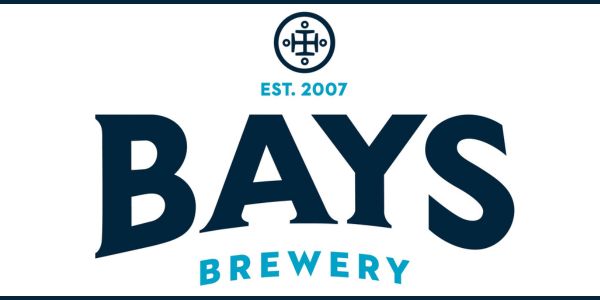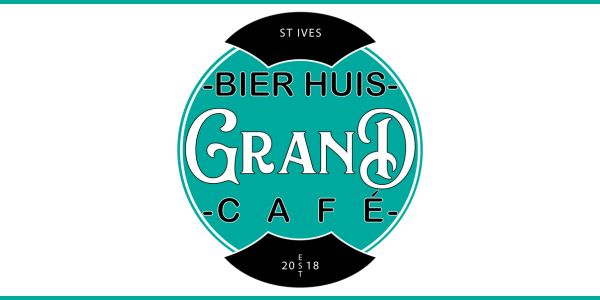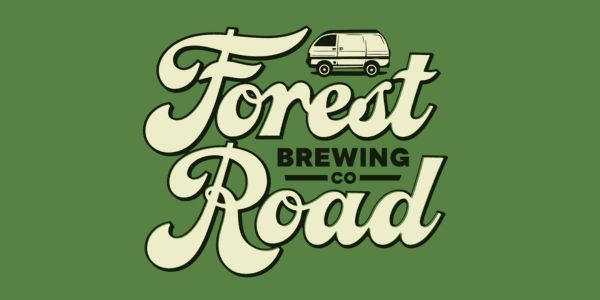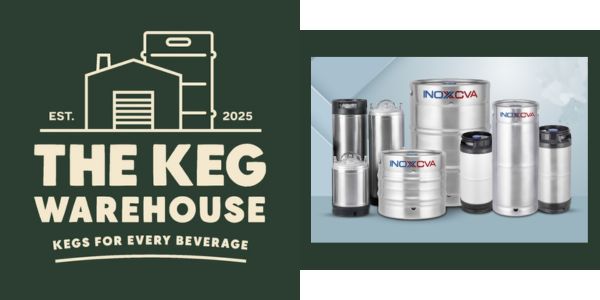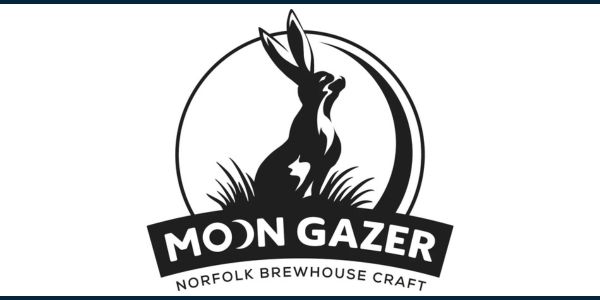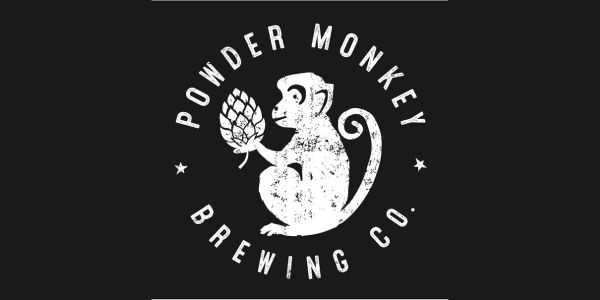Beer Today spent a day at Brook House Hops, in Herefordshire, on its annual hop walk. To see such varied British hops growing and being harvested was a fantastic sight. Here’s how the day went…
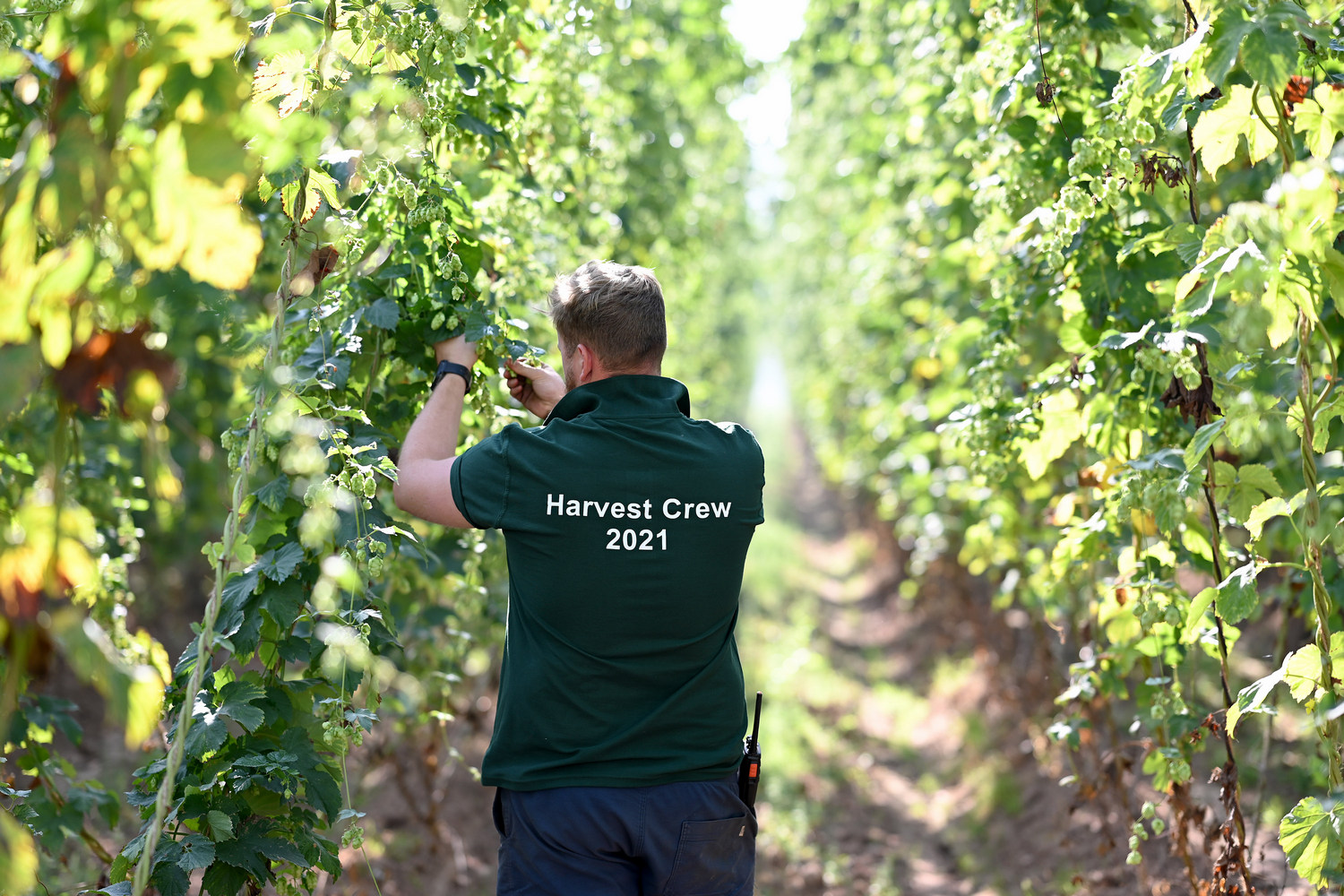
Henry Smith, farmer at Newnham Farm, inspects one of the six hop varieties — Goldings, Pilgrim, Phoenix, Progress, Target, and Bramling Cross — grown there. Photographs: Brook House Hops
On Sunday, the Beer O’Clock Show published a poll on its Twitter account. The question: Do English hop varieties excite you? I voted yes — of course — but with more fervour than usual following a visit to Brook House Hops, in Herefordshire. (Oh, and I think the result of the poll is pretty conclusive. Thank goodness it wasn’t 52%-48% — we’d have been arguing for years.)
It started as a mellow, misty, late summer morning, but stormy weather that had followed me from west Cornwall soon arrived. But who cares? It was still a great hop walk and it was great to see fields of great English hop varieties so beloved of many contemporary British breweries.
Brook House is a relative newcomer to the hop scene in the UK, a disruptor if you will. Its premise is to grow the finest English hops and sell these directly to brewers, rather than to hop merchants. It is also able to supply American hops, thanks to a tie-up with those pioneers in the north-west US, Yakima Chief, as well as varieties from mainland Europe and New Zealand.
Brook House Hops was established by former City financier Will Kirby. He believed his new direct approach would be well received by brewers looking for greater transparency, provenance, freshness, and access to specialist varieties. Four years on, the results show his vision was justified.
There are two farm sites. There’s Bromyard, a few miles from where I visit, where Will and his family are based, and Newnham Farm, where the hop walk took place. Both have acres of beautiful British hops, and both have processing facilities for those hops on site.
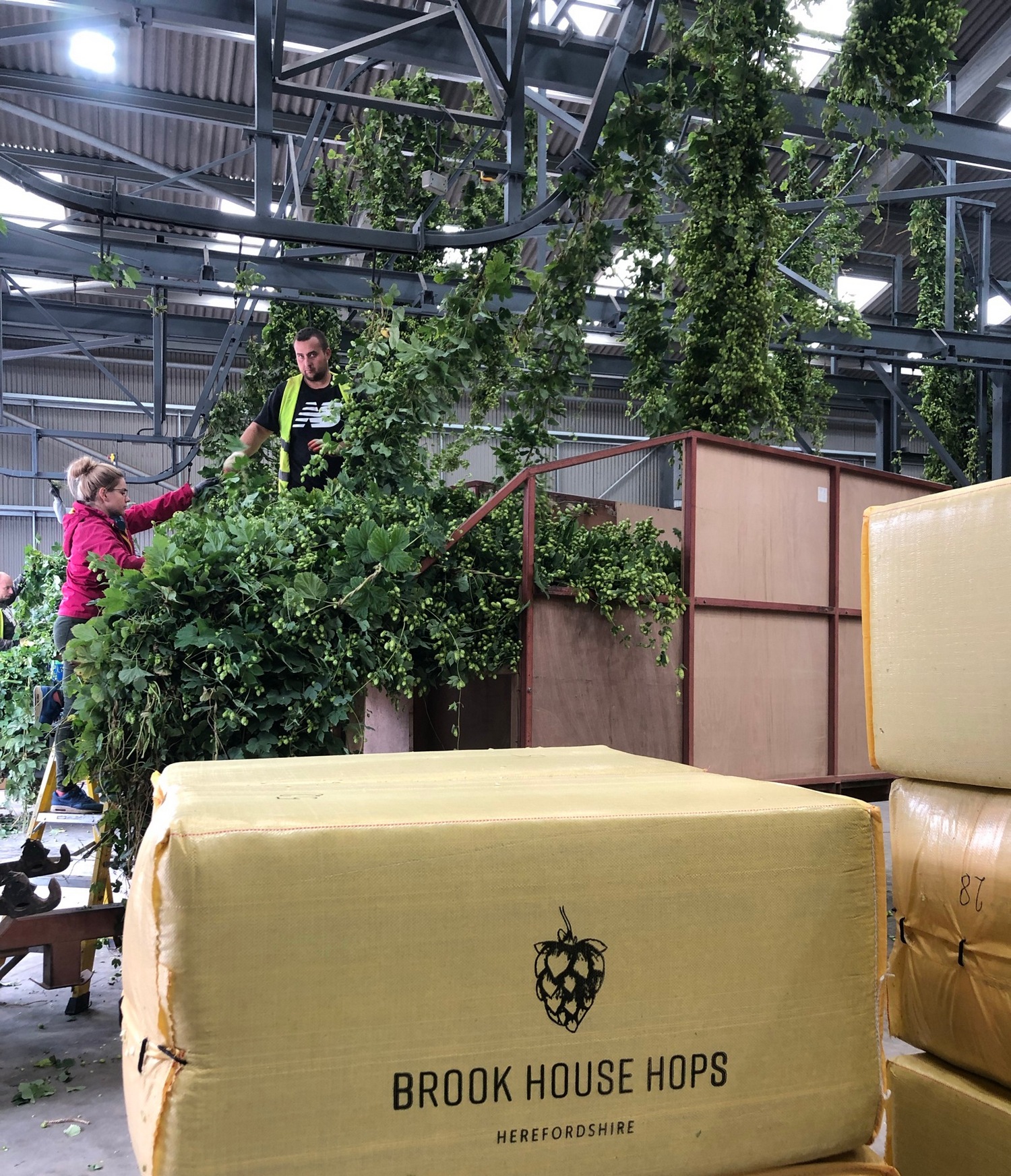
Hop hanging, prior to the bines entering the Dauenhauer hop picker
Our guides for the day were knowledgeable and personable Jim Wilson and Sebastian Nielsen, sales manager (and former brewer) and sales and marketing director respectively. Experts, quite literally, in their fields, they took us to the Progress, Phoenix, and Pilgrim sites, then, via a drive as that bad weather was heading in, Bramling Cross, right on the edge of the farmland. There are some 300 acres across both farm and sometimes transport is essential, although Brook House company vehicles are electric to limit their impact on the environment.
In fact, sustainability is a key part of the Brook House ethos. We took a break by the side of the River Teme, part of 3km of rivers running through the business’s land. This water contributes to rich, productive soils, and the unique terroir of the farms. Clearly, it works well as the harvest is abundant, the hop cones verdant with promise. River management, tree planting, rewilding, and investment in renewable technology are all part of a continuous sustainability programme.
If you’ve never done a hop walk, and you love beer, well, you’re missing out. (But you can do it via the wonder of TV technology — see below!).There’s nothing to match taking some cones fresh from a bine, rubbing them in your hands to release those valuable oils, and getting your nose stuck in. Even such a basic examination will yield familiar flavours: lemon citrus, herbs, spice, pepperiness. We may all love drinking beer, but sometimes the aroma is a huge part of the experience. I’ve left beers for two or three minutes sometimes because I’ve been so enveloped in just enjoying that aroma. One of life’s small, but oh so important, pleasures.
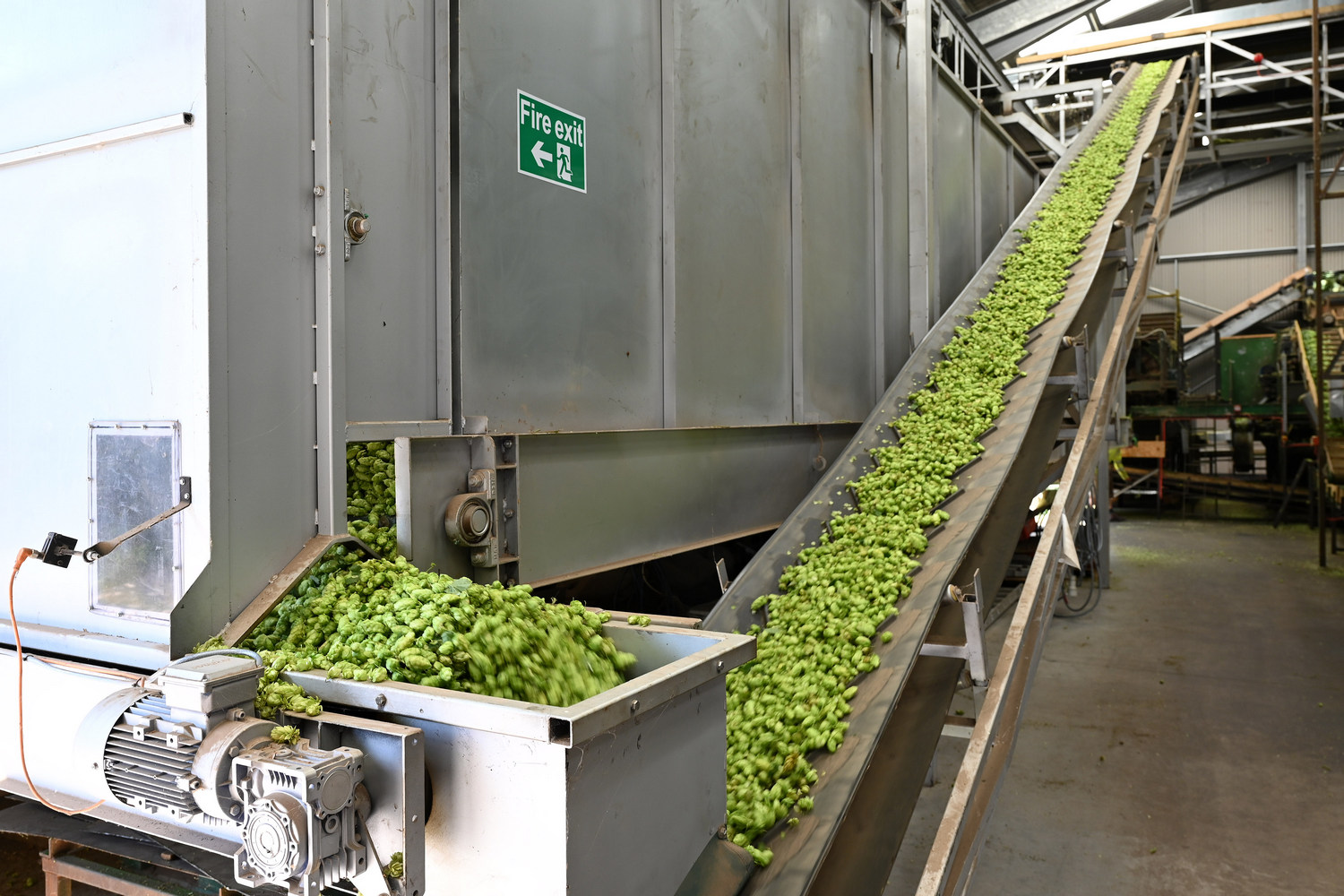
Freed from their bines, the hops head down the conveyor en route to drying
Growing hops, of course, is only the start of the process. Brook House Hops has state-of-the-art hop picking and packaging facilities, at both sites, which is key to the presentation of top quality hops for customers. There is a specific order in which hop varieties are processed — some have a later optimal picking time. Just as well when there are so many fields to get through. Like other industries, getting picking teams together has been a challenge this year, but fortunately, Brook House was able to secure local help in place of many Europeans who had previously turned up annually to help.
To watch the Dauenhauer hop picker in operation is quite a spectacle, lots of noise and vibration. Whole bines are grabbed and fed into the machine, and sooner or later whole hop cones have been separated from the shoots, branches, and leaves, the latter heading off for composting. The hops are kilned to dry them, removing a large percentage of their moisture, and packaged, some as vacuum-packed leaf hops, others as pellets.
Customers range from traditional cask beer brewers to craft brewers experimenting with big juicy IPAs and imperial stouts among their repertoires. Representatives from across the sector took part in the Brook House hops walks over successive days. I was there with a party from Butcombe, but Beavertown were due later. The development of such a broad range of British hops, offering a wide spectrum of alpha levels, means Brook House is interacting with brewers of all backgrounds and sizes. The commitment to quality should ensure the busine thrives and grows. And with less reliance on overseas hops, what’s not to love about making more of British hops. Now thoroughly back as a cornerstone of British brewing.
Feel you’ve missed out? Watch Countryfile!
The BBC paid a visit to Brook House Hops recently, filming a package on the current state of the British hop industry for Countryfile. The team also looked at the hop harvesting process for the programme, which goes out this Sunday, 19th September, at 7pm.
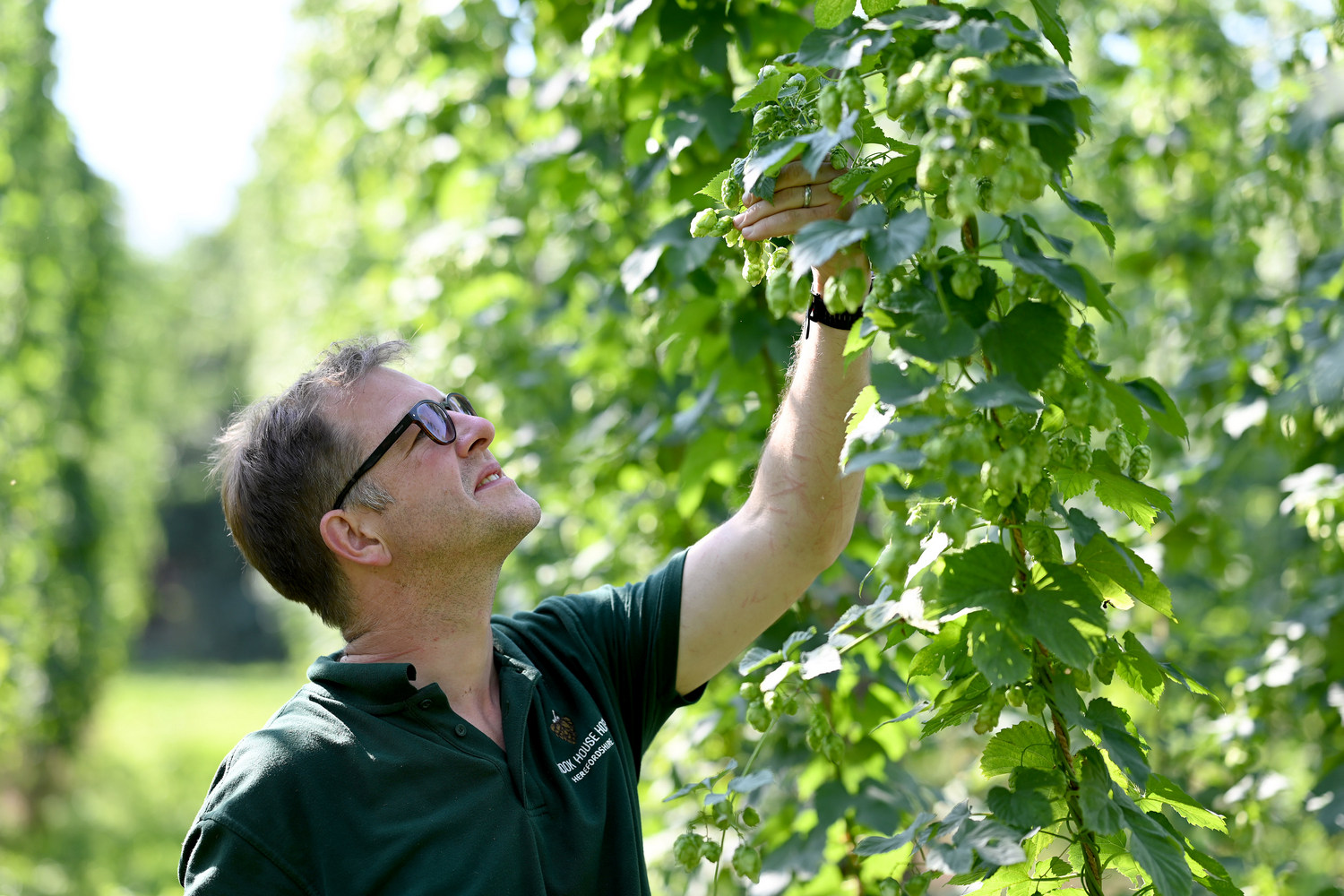
Brook House Hops founder, Will Kirby (pictured above), says: “We’re very proud of the range of British hops we grow and are lucky to have such a passionate and dedicated team who work tirelessly through the year to produce some of the most aromatic and verdant hops in the UK.
“British hops and hop growing is ingrained in the history of our counties and supports our local economy. Our local hop varieties help to make British beer unique and treasured around the world. We feel it is important to recognise this heritage, but also to embrace innovation, become more sustainable, and look to continuously improve in order to protect and grow the industry for the future.
“To have the opportunity to share what we do with the Countryfile team and their audience is simply fantastic. It is the busiest time of the year for us now and the hops need to be picked when they are at their absolute best, so having an extra pair of hands to help with harvest was also very welcome!”


